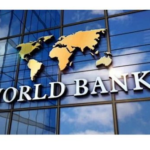Afrexim Bank Predicts African Trade and Economic Outlook Growth at 4% GDP

Despite the prevailing global economic fragility, Africa’s real Gross Domestic Product (GDP) is projected to grow by 4.0% in 2025, according to the 2025 African Trade and Economic Outlook (ATEO) Report released by Afreximbank.
The report further predicts that Africa’s real GDP will reach 4.1% in 2026 and 4.2% in 2027.
The 2025 ATEO Report provides an in-depth analysis of Africa’s economic and trade performance, highlighting the key macroeconomic and trade developments shaping the continent’s recovery.
The report notes that 41% of African economies are projected to grow by at least 5%, nearly double the global rate of 21%, reflecting the continent’s expanding role as a driver of global growth.
According to the report, Africa’s gradual recovery will be supported by increased global demand for African exports, the disinflation trend, and the implementation of structural reforms to diversify African economies.
However, the report also highlights several downside risks to the African economic outlook, including rising geopolitical tensions, fluctuating commodity prices, and economic slowdown in the United States and China.
Internal conflicts and climate change also threaten stability and growth, the report warns. Nevertheless, potential upside risks include the anticipated decline in global interest rates, which could begin in 2025 if geopolitical uncertainty remains unchanged, potentially enhancing access to financing.
The African Continental Free Trade Area (AfCFTA) also presents an opportunity to boost economic integration and intra-African trade, reducing vulnerability to external shocks in the medium term.
To address potential downside risks, the report suggests several short-term strategies, including adopting a nuanced and proactive monetary policy stance, enhancing resilience against climate-related and geopolitical disruptions, and boosting domestic consumption alongside the service sector.
Accelerating the implementation of the AfCFTA agreement is also crucial, the report notes.
In the medium term, the report recommends shifting strategies toward economic diversification through strategic investments in human capital development and workforce training within key emerging sectors. Improving economic governance, public infrastructure, and initiatives to strengthen intra-African trade dynamics are also essential, the report adds.
The 2025 ATEO Report highlights several challenges and solutions for Africa to attain stability and sustainable development amid a rapidly uncertain global landscape. The first challenge identified is Africa’s reliance on commodity exports, which has made countries vulnerable to fluctuations in world commodity prices. To reduce their exposure to these price fluctuations, it is crucial to accelerate the structural shift to a more diversified and resilient economy, the report notes.
The second challenge is debt sustainability, with several African countries allocating over 50% of their revenues to debt servicing due to their large development financing needs. Ensuring debt sustainability requires more efficient public spending and prioritization of growth-oriented investment projects, the report states.
The third challenge involves human capital and skill development, with the report suggesting that governments should invest more resources to improve healthcare and promote collaboration between the public and private sectors. Strengthening training in sciences and technology facilitates skill development and talent allocation, which is essential for successful structural transformation, the report notes.
The fourth challenge is the weak social outcomes of economic growth in Africa, caused by slow progress in poverty reduction. To boost poverty-reducing potential growth, improving the provision of basic public infrastructure and services is vital, reducing dependency on natural resources through structural transformation, the report states. Addressing inequalities must be an integral part of sustainable development goals, ensuring equitable access to quality education, healthcare, energy, transport infrastructure, and financial services.
Finally, the report highlights the growing concerns about environmental degradation and the increasing frequency of extreme weather events. For sustainable economic development, the promotion of green growth must align with comprehensive policy frameworks that address climate change adaptation and mitigation strategies, while recognizing continental development needs and challenges, the report concludes.









